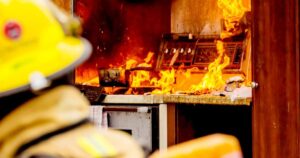It's Fire Prevention Week, and the National Fire Protection Association (NFPA) is focusing on cooking safety this year. You might not realize that your kitchen is one of the most dangerous rooms in your home.
Fire Prevention Week 2023: How to Protect Your Home And Loved Ones From Kitchen Fires
SafeWise experts have years of firsthand experience testing the products we recommend. Learn how we test and review.
- Fire Prevention Week is October 8–14, 2023.
- Cooking fires are the main cause of home fires and injuries.
- Ranges and cooktops contribute to over 50% of all home cooking fires.
Sign up for our free weekly newsletter to get the best safety news, product info, and deals.
By signing up, you agree to our Terms and Conditions and Privacy Policy.

Image: SOPHIE-CARON
Cooking fire statistics
The statistics around home fires related to cooking are staggering:
- Leading cause of home fires: From 2017 to 2021, home cooking fires were the leading cause of reported home fires and resulting injuries—home fires were also the second leading cause of home fire deaths.
- Injuries and fatalities: Home cooking fires also led to the highest number of home fire injuries (4,150) and were the second leading cause of home fire deaths (470).
- Common culprits: Ranges and cooktops were implicated in a significant portion of these incidents, contributing to 53% of home cooking fires, 88% of cooking fire deaths, and 74% of cooking fire injuries.
3 tips to prevent cooking fires
These feel like five-alarm statistics, but the good news is that all these fires are preventable with the right precautions. Here are three actionable tips you can use today to make your kitchen safer for you and your family.
Tip 1: Test your smoke detector
Smoke detectors are often overlooked but are critical for home safety. Nearly three out of five home fire deaths occur in homes without functional smoke alarms. A simple monthly test of your kitchen smoke detector can ensure it's in working order. Just press the "test" button and wait for the alarm.
Remember that smoke detectors have a lifespan; you should replace the batteries as needed (don't ignore that annoying chirp) and the unit itself every ten years. Consider investing in smart smoke detectors with added benefits like remote alerts and carbon monoxide detection.
Tip 2: Clean the kitchen for safety
Regular kitchen cleaning isn't just about aesthetics; it's about safety, too. Approach kitchen cleaning from a fire safety perspective.
- Wipe down grease and residue on cabinets—grease fires can be extremely dangerous.
- Move any flammable materials, such as rags, towels, curtains, oven mitts, and recipe books, away from cooking appliances.
- Check the expiration date on your kitchen fire extinguisher, and place it in an easily accessible spot near the stovetop or range.
1. Identify a clear exit/escape route
2. Stand back
3. Discharge the extinguisher, and don't forget to PASS:
- P: Pull the pin on the fire extinguisher.
- A: Aim low with the extinguisher nozzle toward the base of the fire.
- S: Squeeze the handle or lever to discharge the extinguisher.
- S: Sweep the nozzle back and forth. Keep the fire extinguisher aimed at the base of the fire and move it from side to side until the flames are extinguished.
Learn more about how to correctly use a fire extinguisher in our guide.
Tip 3: Practice safe cooking habits
Safe cooking practices are crucial in preventing kitchen fires. Never leave your meals unattended, especially when frying or broiling, as these cooking methods can generate extreme heat that may lead to fires. Learn how to extinguish a grease fire (hint: never use water) and keep a heavy pan nearby to smother flames if necessary.
If you want to learn more, check out our two-part interview with Andrea Vastis, NFPA Senior Director of Public Education. We chat about the history of Fire Prevention Week, how to prevent house fires, and best practices around holiday cooking.
As Fire Prevention Week continues, take these simple steps to make your kitchen—and entire home— safer. The big cooking days are approaching with the holidays around the corner. Start practicing good culinary safety habits now to prevent house fires later.
Related articles on SafeWise
Recent Articles





